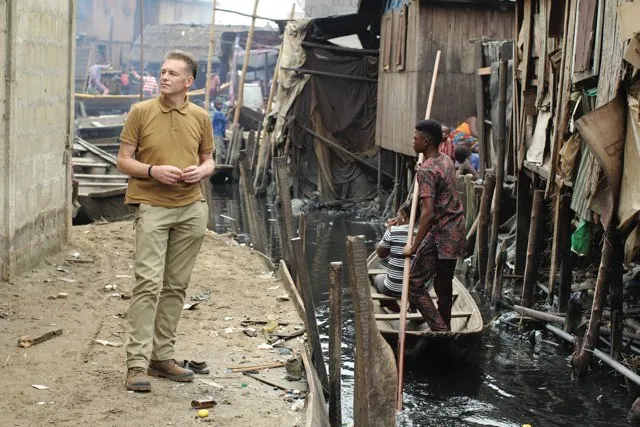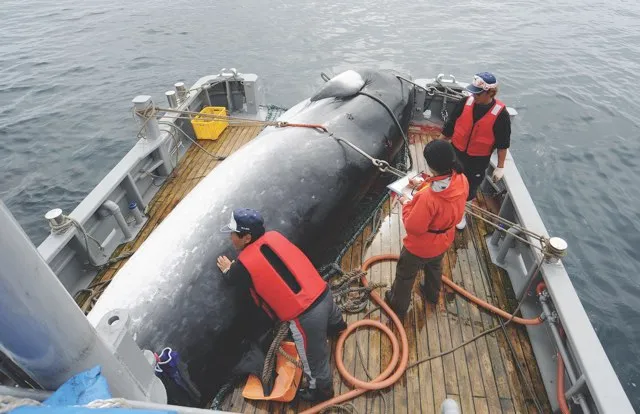With all of the problems in the world, what keeps you awake at night?
Our greatest worry of all is human population growth, in my opinion.
Climate change is going to make life hell, and it’s going to have disastrous consequences, but I think that as a species, we are so adaptable and innovative and intelligent that we will cope with that. It won’t be comfortable, I’m not saying it’s going to be great.
What we can’t cope with is that there are just too many of us. Because if you run out of resources, it doesn’t matter how well you’re coping: if you’re starving and thirsty, you’ll die. So we’ve got to start talking about this.
How would you tackle that problem?
The first thing I’d do is globally emancipate and educate women. In every situation where that has happened, we see women get married later, and they have fewer kids. Think of all the countries around the world where women cannot access education, careers and equality. That would make a profound difference.
For filming, I went to a slum in Nigeria where only 10 per cent of the kids were in any form of education, and the education by our standards was rudimentary. We met three young women there who had come out of the most abject poverty you can imagine, and they were at university. I asked them, were they married? No. They all laughed. That’s crazy.
And I asked them how many kids they might have if they start a family? They said two, three. As opposed to the 10 that some women there are having.
Speaking to those young women was just brilliant. They’d fought against misogyny and chauvinism to get an education, and it was paying dividends for them. There are women all over the planet that could do that if we gave them the chance.

You’re presenting Blue Planet Live with Liz Bonnin and Steve Backshall. What’s the plan?
There are two objectives: we want to engage the audience, and we need to get close to the animals and be able to tell their stories. We’re also doing an overview of oceanographic health.
For instance, the Japanese have said they’re going to resume commercial whaling in their own waters. I thought, Japan, relatively small island, so the waters they have control of will be relatively small. But I was wrong. They cover an area the size of India, and within that area there is an extraordinary diversity of whales.
These sorts of issues, whether it’s welfare, exploitation, overfishing, pollution, plastics, will all be on our agenda.
Where will you be presenting from?
I will go to Baja California, in Mexico. It’s quite remote. Because it’s equatorial, nature there has a high diversity and productivity – lots of turnover.
Last time I was there we went out one night looking for squid, and a school of pilot whales went by and half an hour later they were still coming past. We couldn’t believe it. There were thousands of these animals in this school.
Do you think about balancing environmental problems with the positives about nature?
You can’t be all doom and gloom. Firstly, people have got to care, and then you’ve got to make them want to take action, and they’re only going to care if they are entranced by it.
I’m trying to leave this planet in a slightly better state than it was when I arrived, and at the moment I’m losing very badly, so I’m trying ever harder to achieve that objective.

Do you think that’s something we’ll be able to achieve?
I think we will suffer some very sad losses, and we will continue to make some poor mistakes.
But ultimately, we are a resourceful, adaptable, intelligent species, and when it comes to the crunch, I think we’ve got the toolkit and the people to turn it around.
What needs to change?
For me, there is no ambiguity about the fact that continued economic growth is the fastest route there is to global catastrophe. We cannot continue to entertain that sort of growth, because it’s fuelled by consumption of the Earth’s resources.
This model of thinking – that everything has to be a growth progression – is entirely fallacious, and it’s come to the point now where it’s downright dangerous. That really, really worries me.
[Politicians] need a far greater awareness of the environmental imperilment of the planet. And I say ‘planet’ because we’re one species on one planet with one problem. We separate ourselves with flags and lines on the ground, but there’s no time for that any more.
Donald Trump doesn’t seem to appreciate how bad a state the planet is in. What would you say to him, given the chance?
I’d want to find out the truth about what motivates him. Does he genuinely believe what he says, or does he have another motive?
I need to scientifically analyse Donald Trump.
I want to know why he feels that way. How did he get to that point where he wants to build a wall? How did he get to the point where he’s deconstructing environmental legislation all across America, with catastrophic results?
The other thing is that people with Asperger’s are typically very, very manipulative. Not in a nasty way, but we see things in detail, we watch people in detail, and we learn a lot about them, and then we use that knowledge to get them to do what we want.
That’s the approach I would take. I wouldn’t spend 10 minutes shouting at Donald Trump. That’s what everyone else is doing, and it’s clearly not working. I’d spend 10 minutes trying to understand what makes him tick.
You recently gave a speech about Alan Turing for BBC’s Icons. Why did you want to speak about him?
Firstly, he was a scientist, and I think that science has been disregarded recently. There are people saying they have had enough of experts, but I firmly believe that we should be listening to the scientists.
My father’s a keen military historian, so I’ve known of Alan Turing from a young age. We can’t give retrospective diagnosis, but it’s highly likely that Turing had Asperger’s, so there’s a sort of kinship between us.
Read more:
- How small can a population be and still survive?
- Climate change is turning dehydration into a deadly epidemic
I had read a few books about his life before we did the programme, and there were parallels with my own. He was bullied at school, he was ostracised, he found it difficult to fit in socially. The additional burden that he endured was that he was homosexual at a time when homosexuals were ruthlessly persecuted. And yet he still demonstrated extraordinary genius.
Then the tragedy is that society basically brutalised him and betrayed him. There’s a sense of guilt about that, and I think it’s warranted. The thing about people like myself, people with Asperger’s, we hate injustice. We hate personal injustice particularly. So I really felt the injustice that had been wrought upon Alan Turing. It was something that angered me and motivated me and shamed me.
Many people on the autism spectrum make valuable contributions to science...
Yes, and I agreed to do the Asperger’s And Me programme on the basis that we celebrate my type of autism. There are many people with that condition who are capable of achieving great things.
One of the other aspects of the condition is that we don’t care what other people think quite as much, so we take risks. We say what we think, we tell the truth, even if it’s hard for other people to hear. And I think that for people with Asperger’s, there’s no box. We don’t see any boundaries.
Turing didn’t see that there was any issue over cracking the enigma code – it was just a question of how to do it. I think that, in the modern world, that is something extremely valuable.
I was really keen for both of these programmes [Asperger’s And Me, and Icons] to speak to young people who are in the most desperate stages of dealing with the condition, in their teens and early 20s. That’s when they are in education, when they might have an aptitude for science.
It’s very important to say: “We believe in you. We know that you’ve got skills. It doesn’t matter that you can’t socialise, or that you don’t want to socialise, or you’re clumsy, or you can’t interpret this, that and the other. There are things that you can do that no one else can. You must embrace the good parts of your life.”
I had no one telling me that when I was young, and it made my life very, very difficult. I thought that I was broken. So, I’m keen to say, “Look, we need you, and we will make the world work for you, and it will be mutually advantageous.”
- This article was first published onBBC Science Focusin March 2019 –subscribe here